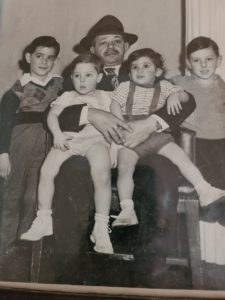I am pleased to introduce Howard Marks as our Saturdays with Seniors guest blogger today. The essay he wrote when I assigned “My Grandfather’s Job” pays homage to his maternal grandfather for exposing 12-year-old Howard to the merits of quality journalism. After graduating high school, Howard studied at the University of Illinois-Chicago and became editor-in-chief of the student newspaper. From there he worked at the Chicago Today, the Chicago Tribune, and then the Reader’s Digest in New York City. He received a Master’s Degree in Journalism from Northwestern University and worked for the late Sen. Chuck Percy (R-IL) and was an appointee at the US Department of Agriculture in the Ronald Reagan administration before retiring.
With memoir-writing classes meeting via Zoom now, Howard is able to participate from his home in Washington, DC. We feel lucky to have a pro like him with us!
by Howard Marks

Picture of Abe (Pa) Prohovnik taken in 1946 with four grandsons who later served as helpers at his West Side newsstand. Howard, today’s guest blogger, is being held in Pa’s left hand. He’s the one with a patterned shirt and mock suspenders.
My maternal grandfather, Abraham Prohovnik, was 23 years old when he immigrated to the United States in 1904 hoping for a better life. As he was affectionately known, “Pa” had lived in an area of Poland controlled by Russia. Like many in his family, he became a master baker and found himself conscripted into the Czarist Army. Legend has it that the officers so loved his tasty and moist Russian black bread that at the outbreak of the Russo-Japanese War of 1904 they ordered him to accompany his unit when it was dispatched to the Manchurian front. Fortunately, he wisely deserted and escaped from Russia by bribing border guards. The war was a killing field for the Russians, and, of course, Jews were unjustly accused of secretly collaborating with the Japanese enemy.
Pa made his way to Hamburg, where he boarded a passenger ship for Montreal and traveled first class across the North Atlantic. Amongst the 10 percent of European immigrants who bypassed Ellis Island, Pa resumed his journey via the Grand Trunk Railroad and entered the United States at Detroit.
Finally arriving in Chicago, he lived with a first cousin, his sponsor. Pa’s wife Sarah and their first-born son joined them soon after. On July 7, 1916, he became an American citizen, requiring him to renounce any allegiance to Nicholas II, Emperor of all the Russias. The family prospered and eventually owned a string of eight bakeries in Chicagoland and northwest Indiana. By then the family had grown to three daughters — including my mom, of blessed memory, and two sons. They all lived above the main bakery on Maxwell Street and Halsted — Chicago’s famous immigrant marketplace.
Then the Great Depression hit.
Pa was forced to sell the bakery, but he later took up a second career that changed his life — and mine, too. He bought a newsstand at Jackson Boulevard and Pulaski Road on Chicago’s West Side. Although in his seventies, he sold newspapers seven days a week, arising at 5:00 am each day. He worked on Saturday nights, too. The four male cousins in the photo above served as his helpers. At age 12, I was introduced to a world I never knew existed: the excitement of the newspaper industry.
Before the internet, most Chicagoans got in-depth news from the likes of the Tribune, Sun-Times, and Herald-American. The Sunday newspaper was the most coveted of the week. What bedlam! Bundles of Tribunes were tossed six feet on the sidewalk with a thud from the back of a delivery truck that only slowed down, but didn’t stop. My job was to stuff the main print edition with the Sunday supplements. Two more editions were to arrive that evening plus one more the following morning.
After working at the newsstand for more than two years, I decided I wanted to be a newspaperman. Never would I dream that I would work for two of the newspapers I sold. Pa was still selling newspapers in 1958 when he died at age 79, while on the dance floor for his Golden Age club at his synagogue in Chicago’s Austin neighborhood. Thanks, Pa, for taking on a second career and thus launching my exciting career in journalism.
I’m so glad that Howard’s Pa was wise enough and lucky enough to flee safely!
What a heartwarming story. It takes me back to my newspaper delivery days in the Chicago suburbs. Up in the early hours, stuffing papers and delivering, seven mornings and five evenings a week. Of course, my news days end there, but the memories I have are still good.
Thank you for a lovely snapshot of the past, a glance backwards in time. One can hear the bundle of newspapers drop and anticipate the tedious work that followed. Very well told.
Howard, this story gets better and better. I hope we get more of your newsboy days, more of your grandparents, more period. Love the photo!
Howard, I chose to feature your essay this week after it received such a positive response from the writers in class who had the privilege of hearing you read it out loud last week. The comments above confirm I made a good choice! Like Regan, I hope you will return for our next six-week class and share more of your stories then — you teach us so much
Leave a Response